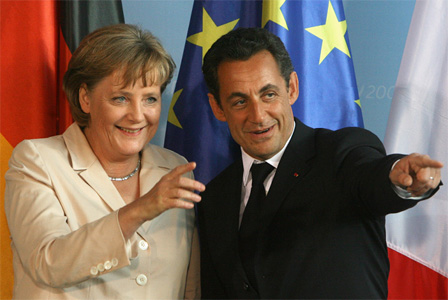"One by one, the leaders of Europe's three biggest immigration destinations have stepped up to solemnly repudiate a policy that has long ceased to exist. In recent months, German Chancellor Angela Merkel, British Prime Minister David Cameron and French President Nicolas Sarkozy have let it be known that multiculturalism shall no longer be the continent's doctrine of immigrant integration. 'The multicultural approach, saying that we simply live side by side and be happy about one another, utterly failed,' declared Merkel in a speech in October 2010. 'Under the doctrine of state multiculturalism, we have encouraged different cultures to live separate lives, apart from each other and apart from the mainstream. We've failed to provide a vision of society to which they feel they want to belong,' said Cameron on February 2011. 'Multiculturalism is a failure. The truth is that in our democracies, we cared too much about the identity of the migrant and not sufficiently about the identity of the country that welcomed him,' Nicolas Sarkozy announced on French TV later that month. These unusually convergent statements would seem to signal a dramatic turning point in Europe's relations with its Muslim populations, who are the target of these putative reforms. The speeches were designed to convey the image of political leaders fully in control of their national destiny, boldly charting a new course for their societies. The reality, however, is far less grandiose. Merkel, Cameron, and Sarkozy are playing a catch-up game with the right wing of their constituency by savaging a straw man -- multiculturalism -- and offering precious few concrete proposals behind their new proposed course of action." (ForeignPolicy)
"'We competed to see who could play harder, then show up for work and still kick ass,' Rob Lowe tells Vanity Fair contributing editor Vanessa Grigoriadis about filming Masquerade in the Hamptons in 1987 while his then buddy, Charlie Sheen, was filming Wall Street. 'The verdict: Charlie by a nose.' Lowe tells Grigoriadis that his friends growing up in Malibu pre-fame were the 'uncool' guys who didn’t surf: Chris Penn and Charlie Sheen. 'The cool girls in Malibu had no time for me,' Lowe says. 'I wasn’t a beach volleyball player, a surfer, or a quasi-burnout.' However, as Lowe recounts in a Vanity Fair excerpt from his upcoming autobiography, it would be a mere five years after plotting their acting careers in the Sheens’ pool that the actor and his friends would be shot to fame. Grigroriadis writes that Lowe 'wasn’t embarrassed to admit that he began landing the cool girls,' which the actor confessed over the years included Demi Moore, Nastassja Kinski, Princess Stéphanie—who, Lowe remembers 'with a fair amount of residual pride,' had a poster of him—and Washington secretary Fawn Hall, whom Lowe tracked down after seeing her at the Oliver North trial." (VanityFair)
"It boasts a star-studded cast that includes Owen Wilson, Rachel McAdams and Marion Cotillard. But all eyes will be on France's premiere dame Carla Bruni as she makes her acting debut in Woody Allen's latest film, Midnight in Paris. And although the movie is not set to be released until May, followers can preview Carla's acting skills in the trailer. It features President Sarkozy's wife in a cameo role as a buttoned up curator at the famous Rodin museum. Described by one film critic as a 'love letter to Paris', the romantic comedy follows an engaged couple, eager to experience the charms of the city. But Rachel - playing the fiancée - becomes concerned when her husband-to-be (Owen) begins to disappear for hours on nightly strolls, and a detective hired to follow him vanishes into thin air. When it was filmed crowds flocked to the French capital last year to catch a glimpse of former model Carla in action. And the excitement extended to her husband, who couldn't resist visiting the set to see what his glamorous other half shooting her scenes." (Hello!Magazine)
"This White House moment happened at a time when Elizabeth Taylor had become a part of Washington, as inexplicable as that may seem. It was a festive time in the capital. Post-Watergate. Post-Vietnam. She showed up a lot, usually in the company of Andy Warhol, Halston, and Liza Minelli. She would party till the wee hours at raucous and extravagant parties hosted by Iranian Ambassador Ardeshir Zahedi. These were the last years of when the Shah still had Iran and Zahedi was his man in the U.S., and Washington hasn’t known anything like him (or that moment) since. He was precisely Liz Taylor’s perfect host, with limitless supplies of champagne, caviar, jets, baubles, and opportunity. The high life slowed when John Warner came along and swept Taylor off her feet. He was divorced from a Mellon, had some some Mellon money, was a country gentleman, former Navy Secretary, and aspiring politician. In 1976 they married and Warner parked her at his remote Atoka Farm in the rolling “hunt country” fields between Middleburg and Upperville."(NYSocialDiary)
"With a quarter of a million people on the streets of London protesting against the UK budget cuts, and with the US government days away from a potential shutdown, the social divisions over fiscal policy are deepening. It is not hard to see why. Both the US and UK have experienced a profound shift of income distribution from the poor and the middle-class to the rich in the past 30 years yet the fiscal adjustments are dominated by sharp cuts on public services combined with reductions on corporate tax rates. The social contract is under threat. Only international co-operation can now solve what is becoming a runaway social crisis in many high-income countries. The underlying political and economic forces tearing our societies apart are very powerful. The rise of globalisation, and especially the entry of China and India into the world markets, has put extreme downward pressure on wages of low-skilled workers while giving new opportunities for financial and business investments. The pre-tax income of the top 1 per cent of households has soared, from 10 per cent of household income in 1979 to 21 per cent in 2008 in the US, and from 6 per cent in 1979 to 14 per cent in 2005 in the UK. With capital globally mobile, moreover, governments are now in a race to the bottom with regard to corporate taxation and loopholes for personal taxation of high incomes. Each government aims to attract mobile capital by cutting taxes relative to others. Governments like Ireland have created tax havens that drain revenues from the rest and act as conduits to tax-free Caribbean hideaways such as the Cayman Islands. The rich are doubly benefited: by the underlying market forces of globalisation and by their governments’ policy response." (Jeffrey Sachs)
"By force of will and a fierce work ethic, Gov. Cuomo has pulled off the near-impossible with a budget agreement that closes a $10 billion projected deficit without the tax hikes, fees and fiscal gimmicks that have been so common in the past. Even more breathtakingly, he did it in the face of a spendthrift Legislature that had helped turn New York's government into a joke line on 'Saturday Night Live.' Cuomo's victory holds out the hope of inaugurating a new economic era that reverses the decades of private-sector decline and public-sector expansion that began with Republican Gov. Nelson A. Rockefeller in the early 1960s. Paired with a similar decision made by New Jersey's Chris Christie, Cuomo's action could help redefine the bi-state area, now known as one of the most business-hostile regions in the nation. Cuomo achieved his success through weeks of planning, analysis and an intense series of anticipatory tactics that friends and foes alike call three-dimensional political chess." (Fred Dicker)
"Is it 50 billion euros? Or perhaps 70 billion euros? The cost of bailing out Portugal varies according to who makes the calculation. No one will know the real price until officials from the International Monetary Fund and the European Central Bank tell us. But it isn’t the actual amount that counts. It is the price the euro area is paying for having a single currency. And on that measure, a rescue package for the beleaguered Portuguese economy comes with far too high a price tag attached. It will raise too many questions about whether the euro can ever be made to work; it will mean there is no longer a firewall that stops the crisis from spreading to Europe’s core; and the Portuguese don’t seem willing to accept the same type of austerity package that Greece and Ireland got ... The country needs money. It faces redemptions valued at about 9 billion euros ($12.7 billion) in total on April 15 and June 15, perhaps around the time of early elections to choose a new government. Portugal intends to sell as much as 20 billion euros of bonds this year to finance its budget and cover maturing debt. Right now, it doesn’t look as if the markets are willing to come up with that kind of cash. That leaves the euro area and the IMF as the only viable alternative -- the same way it was for Ireland and Greece. The money can be found if it has to be. A bill for 70 billion euros won’t bankrupt Germany or France. But just because you can afford something financially doesn’t mean you can afford it in other ways. The euro area can’t take the cost of bailing out Portugal." (MATTHEW lYNN/Bloomberg)
"Rep. Ileana Ros-Lehtinen (R-Fla.) is best known for two things: She hung up on President Obama when he called her on the phone (not believing she wasn’t being punked), and she is a staunch opponent of thawing relations with Cuba while it continues to be run by the Castro tyranny. As the new chairwoman of the Foreign Affairs Committee, Ros-Lehtinen could make a significant new mark during this Congress. Her panel is scheduled to hold a hearing this week on America’s role in Libya. She and other committee Republicans are expected to criticize Obama’s handling of the issue. The Obama-Ros-Lehtinen relationship got off to a rocky start when, as president-elect, Obama called her when she was the ranking member on the Foreign Affairs Committee. Thinking it was a prank, she hung up. Then-White House Chief of Staff Rahm Emanuel called her back, and she hung up on him, too."(Roll Call)










No comments:
Post a Comment